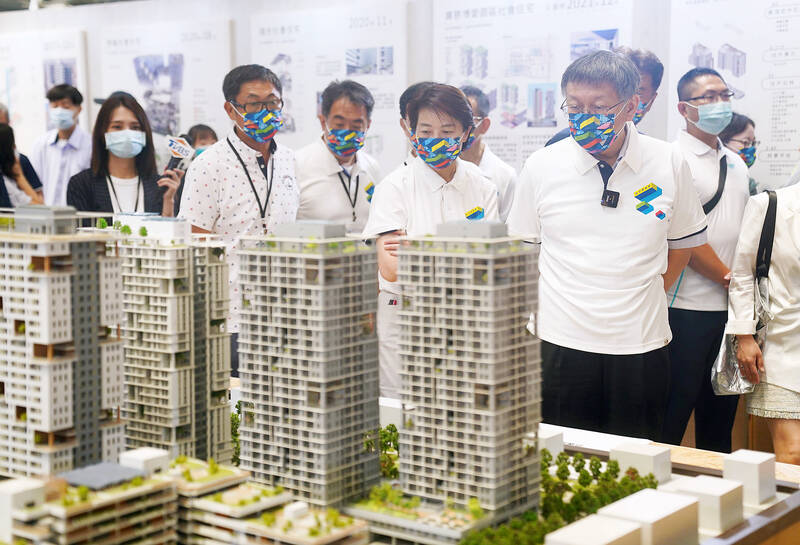Taipei city councilors yesterday asked Taipei Mayor Ko Wen-je (柯文哲) and former deputy mayor Vivian Huang (黃珊珊) to apologize to city residents for spending up to NT$106 million (US$3.3 million) on this year’s Taipei Expo, while avoiding a city council review.
The Taipei City Government held the event at the Taipei Expo Park from Aug. 27 to Sept. 11.
City councilors in August criticized the Ko administration for using the city’s second reserve fund — about NT$29.6 million from last year and about NT$49 million from this year — to host the event, seemingly to avoid a requirement that an expenditure of NT$50 million or more be approved by the city council.

Photo: CNA
Democratic Progressive Party (DPP) Taipei City Councilor Wu Pei-yi (吳沛憶) on Sunday wrote on Facebook that a Taipei Department of Government Ethics report revealed that in addition to tapping into the second reserve fund, the city government used about NT$12.62 million from 15 city departments on the expo.
Wu, along with DPP Legislator Rosalia Wu (吳思瑤) and Taipei City Councilor Chien Shu-pei (簡舒培), yesterday told a news conference in Taipei that Ko’s administration has poor financial discipline, and questioned whether Huang had ordered city departments to organize the expo.
About 105,000 people attended the 12-day event, which was originally to cost about NT$86.1 million, but a city councilor later discovered that the true budget was hidden among the operational budgets of departments and the total cost was as much as NT$169.4 million, Rosalia Wu said.
This year’s Keelung City Expo cost NT$40 million and attracted more than 1 million attendees over 10 days, she said, adding that the Keelung City Government had proposed the budget in the previous year and it passed a city council review.
Wu Pei-yi said the Department of Government Ethics’ report showed that money for the Taipei Expo came from the city’s first and second reserve funds, the annual operational budgets of 15 departments and a special budget to build a new MRT line.
At the news conference, Chien showed a photograph of a note allegedly written by Huang on Oct. 4 last year, instructing a department to use NT$9 million from the city’s second reserve fund for the expo at the direction of the mayor.
Chien asked why Huang skipped the budget allocation review.
She also called the expo a “graduation ceremony” for Ko and a “red carpet” for Huang, who in late August resigned as deputy mayor to run for Taipei mayor as an independent candidate, with Ko’s endorsement.
Huang yesterday said that she wrote the note, but that the instructions were based on prior discussions and made at the direction of Ko.
Formal documents were signed afterward, so the procedure could stand up to scrutiny by the National Audit Office, she added.
The second reserve fund was used because the expo was based on a new city plan formulated after the annual operational budget was allocated, she said.
Chinese Nationalist Party (KMT) Legislator and Taipei mayoral candidate Chiang Wan-an (蔣萬安) said that city expos should enhance residents’ sense of identity and pride, but Ko’s administration rushed the event, without comprehensive planning, and held it for the sake of hosting it, as if lighting a firework.
He urged Ko and Huang to respond to questions about moving money from the budgets of city departments for the expo.

The manufacture of the remaining 28 M1A2T Abrams tanks Taiwan purchased from the US has recently been completed, and they are expected to be delivered within the next one to two months, a source said yesterday. The Ministry of National Defense is arranging cargo ships to transport the tanks to Taiwan as soon as possible, said the source, who is familiar with the matter. The estimated arrival time ranges from late this month to early next month, the source said. The 28 Abrams tanks make up the third and final batch of a total of 108 tanks, valued at about NT$40.5 billion

Travel agencies in Taiwan are working to secure alternative flights for travelers bound for New Zealand for the Lunar New Year holiday, as Air New Zealand workers are set to strike next week. The airline said that it has confirmed that the planned industrial action by its international wide-body cabin crew would go ahead on Thursday and Friday next week. While the Auckland-based carrier pledged to take reasonable measures to mitigate the impact of the workers’ strike, an Air New Zealand flight arriving at Taipei from Auckland on Thursday and another flight departing from Taipei for Auckland on Saturday would have to

A group from the Taiwanese Designers in Australia association yesterday represented Taiwan at the Midsumma Pride March in Melbourne. The march, held in the St. Kilda suburb, is the city’s largest LGBTQIA+ parade and the flagship event of the annual Midsumma Festival. It attracted more than 45,000 spectators who supported the 400 groups and 10,000 marchers that participated this year, the association said. Taiwanese Designers said they organized a team to march for Taiwan this year, joining politicians, government agencies, professionals and community organizations in showing support for LGBTQIA+ people and diverse communities. As the first country in Asia to legalize same-sex

MOTIVES QUESTIONED The PLA considers Xi’s policies toward Taiwan to be driven by personal considerations rather than military assessment, the Epoch Times reports Chinese President Xi Jinping’s (習近平) latest purge of the Chinese People’s Liberation Army (PLA) leadership might have been prompted by the military’s opposition to plans of invading Taiwan, the Epoch Times said. The Chinese military opposes waging war against Taiwan by a large consensus, putting it at odds with Xi’s vision, the Falun Gong-affiliated daily said in a report on Thursday, citing anonymous sources with insight into the PLA’s inner workings. The opposition is not the opinion of a few generals, but a widely shared view among the PLA cadre, the Epoch Times cited them as saying. “Chinese forces know full well that